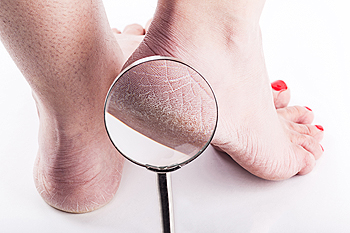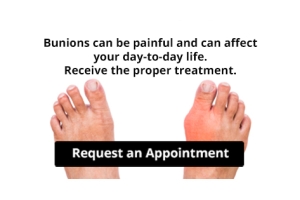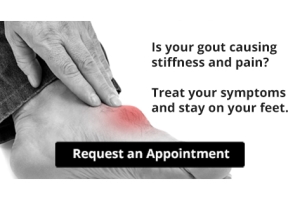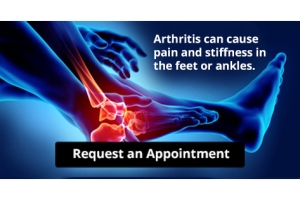
Wounds That Don't Heal Need to Be Checked
Are You Suffering From Ingrown Toenails?
Are Bunions Affecting Your Everyday Life?
Arthritis Can Cause Pain in the Feet and Ankles
What Causes Cracked Heels?
 If you stand for extended periods of time you may experience a condition that is referred to as cracked heels. Certain skin conditions that may include psoriasis and eczema may also play a significant role in the development of this condition. The formation of deep cracks, which are also known as fissures, may result in pain and discomfort, and walking may become difficult. The skin on the heels will typically become dry and is usually a result of obesity, wearing shoes that have an open back, and cold winter weather, which may aid in producing dry skin. An effective remedy includes washing and drying the feet thoroughly, followed by utilizing a good moisturizer that will help the skin become soft. It’s advised to consult with a podiatrist if you are afflicted with severely cracked heels, to learn about proper treatment options that are correct for you.
If you stand for extended periods of time you may experience a condition that is referred to as cracked heels. Certain skin conditions that may include psoriasis and eczema may also play a significant role in the development of this condition. The formation of deep cracks, which are also known as fissures, may result in pain and discomfort, and walking may become difficult. The skin on the heels will typically become dry and is usually a result of obesity, wearing shoes that have an open back, and cold winter weather, which may aid in producing dry skin. An effective remedy includes washing and drying the feet thoroughly, followed by utilizing a good moisturizer that will help the skin become soft. It’s advised to consult with a podiatrist if you are afflicted with severely cracked heels, to learn about proper treatment options that are correct for you.
Cracked heels are unsightly and can cause further damage to your shoes and feet. If you have any concerns, contact one of our podiatrists from Summit Podiatry. Our doctors can provide the care you need to keep you pain-free and on your feet.
Cracked Heels
Cracked heels appear unappealing and can make it harder for you walk around in sandals. Aside from looking unpleasant, cracked heels can also tear stockings, socks, and wear out your shoes. There are several methods to help restore a cracked heel and prevent further damage.
How Do You Get Them?
Dry skin is the number one culprit in creating cracked heels. Many athletes, walkers, joggers, and even swimmers suffer from cracked heels. Age and skin oil production play a role to getting cracked heels as well.
Promote Healing
Over the counter medicines can help, especially for those that need instant relief or who suffer from chronic dry feet.
Wear Socks – Wearing socks with medicated creams helps lock in moisture.
Moisturizers – Applying both day and night will help alleviate dryness which causes cracking.
Pumice Stones – These exfoliate and remove dead skin, which allows for smoother moisturizer application and better absorption into the skin.
Change in Diet
Eating healthy with a well-balanced diet will give the skin a fresh and radiant look. Your body responds to the kinds of food you ingest. Omega-3 fatty acids and zinc supplements can also revitalize skin tissue.
Most importantly, seek professional help if unsure how to proceed in treating cracked heels. A podiatrist will help you with any questions or information needed.
If you have any questions, please feel free to contact one of our offices located in Wilmington, Whiteville, and Wallace, NC . We offer the newest diagnostic and treatment technologies for all your foot care needs.
Solutions for Cracked Heels
Cracked heels can make life very frustrating and embarrassing when displaying the bare feet. Aside from being unpleasing to the eye, they can also tear stockings and socks and wear out shoes at a faster rate. When severe, cracked heels may cause pain or infection.
Cracked heels are a problem for those who are athletic, those who may walk a lot, and those who have especially dry skin. Those who use medication that dry the skin, those who swim often, wearing certain types of shoes, and those who are diabetic may have trouble with cracked heels. Seniors whose skin produces less oil may also have trouble with cracked feet. There is no one way to develop cracked feet, and there is no cure.
Today, the market consists of numerous products that have a variety of ingredients to promote healing. Some of these are over-the-counter. Others are prescribed by a doctor, especially for those who have chronic dry feet and heels.
Some doctors recommend wearing socks at night for those with rough skin. This helps further healing, and helps creams stay on longer and better absorb into the skin.
One way to alleviate dryness that causes cracked heels is by using moisturizers both day and night. Another way is to make sure the skin is clean and dry at all times. Using a pumice stone to buff away dead skin before putting on moisturizer can also help. Cracked heels will not respond to the cream unless the outer layer of skin is first removed through exfoliation. After exfoliation, lotion or ointment will be absorbed by the skin more easily.
Foods that produce healing and balance can also help the skin from within. Everything that is put into the body can either help it or hurt it. Taking supplements of omega-3 fatty acids and zinc can also be very beneficial.
Nevertheless, not all products are guaranteed to help treat cracked feet. Seeing a professional is best if other treatments options were unsuccessful. A podiatrist should be able to give the best advice to help with this problem.

















